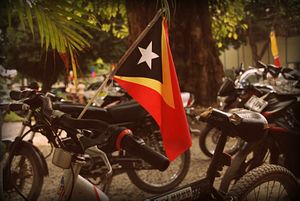It’s a time of immense change for one of the world’s youngest nation-states: Timor-Leste, which gained independence on May 20, 2002. Timor-Leste faces multiple social, political, and development challenges in a post-conflict environment at the local, national, and international levels. However, since independence, Timor-Leste has made significant gains by using its petroleum fund—the country has rich offshore oil and gas resources—to meet pressing development and infrastructure needs.
Timor-Leste has made remarkable progress in some areas. Critical infrastructure is now operational, including transnational highways to Indonesia that are essential for trade and sharing knowledge. Decreases in child mortality rates during the last decade, along with increased citizen participation and the gradual institutionalization of education, mark incremental improvements since independence. Many challenges still exist such as poverty in rural areas, which is aggravated by a lack of good governance, high youth unemployment, and a shortage of critical labor skills. Approximately 40 percent of the population of Timor-Leste now lives below the poverty line, while it is estimated that 30 percent lives in extreme poverty.
An estimated 70 percent of the country’s population lives in rural Timor-Leste. The lack of access to vital social services is an impediment to development, particularly in remote areas of the country. The accumulation of wealth in Dili promotes and encourages urban migration from rural Timor-Leste to the capital. The resulting brain-drain of skilled people in the rural regions weakened the peacebuilding and development process while adding pressure to over-stressed water resources.
Overall, water resource management is inconsistent and clean water remains difficult to attain. It is estimated that one in four people across urban and rural Timor-Leste cannot access clean water.
By 2025, over half of the world’s nation-states will be confronted with clean water deficits, impeding their ability to grow food and access safe drinking water. It is estimated that almost 80 percent of the global population will endure water scarcity by 2050. Already, approximately one in 10 people have little or no access to clean drinking water globally – including 300,000 in Timor-Leste, which is a quarter of the population. Similarly, one in three people across the world – and approximately 700,000 people across urban and rural Timor-Leste — cannot access toilets and other sanitation facilities.
It is estimated that half a million people around the world die from water-borne diseases such as polio, typhoid, and cholera annually, due to a lack of access to clean water. Inadequate water governance in Timor-Leste has facilitated an increase in water-borne diseases, which also advance malnutrition and associated health problems. An estimated 58 percent of the Timorese population suffers from stunted growth, the third-highest rate on the planet. Water-borne diseases remain a dire risk for more than 50 percent of all children in Timor-Leste. Diarrhea-related illnesses are one of the leading causes of death for children below the age of five, which can be attributed to poor water governance.
The administrative capacity of the local and state authorities to initiate the process of peacebuilding and development through water governance is pivotal to the stability and security of any post-conflict state. It is critical in both the immediate and long-term phases during the reconstruction period. Yet water resource management in Timor-Leste remains inconsistent while relying on the international community for knowledge, resources and funds that promote water governance. Evidence suggests that the water governance in Timor-Leste has not improved since independence in 2002.
The government and people of Timor-Leste have not always had the means to provide necessary water resource management. The lack of resources can be attributed to the illegal occupation by Indonesia from December 1975 until October 1999 and other complex post-conflict challenges such as the destruction of critical infrastructure and a lack of financial investment (both private and public) centred around water resources. Other obstructions to water governance and water resource management in post-conflict states include a lack of skilled local and state actors due to years of conflict, inadequate budget allocation toward water-related matters, and a lack of political will to prioritize water resource management.
In Timor-Leste, water resource management encompasses a broad range of strategies that endeavor to improve the quality of people’s lives in both urban and rural areas. These include various social and development issues such as providing water and sanitation, mitigating the impacts from climate change, food security, capacity building, and health and education for vulnerable stakeholders such as women. All of these efforts help alleviate poverty. Also to be considered is how the government will manage water resources with diplomatic partners (for example, Indonesia, with which Timor-Leste shares both land and maritime borders).
Post-conflict Timor-Leste needs a paradigm shift with the idea of decentralizing the governance of water resources. This will assist in the construction of a water governance framework that includes key elements such as engaging in the local and the international communities for the future of clean water in Timor-Leste.
Christopher Ryan is an academic in International Relations at Curtin University. His area of interest is post-conflict peace building and development.

































